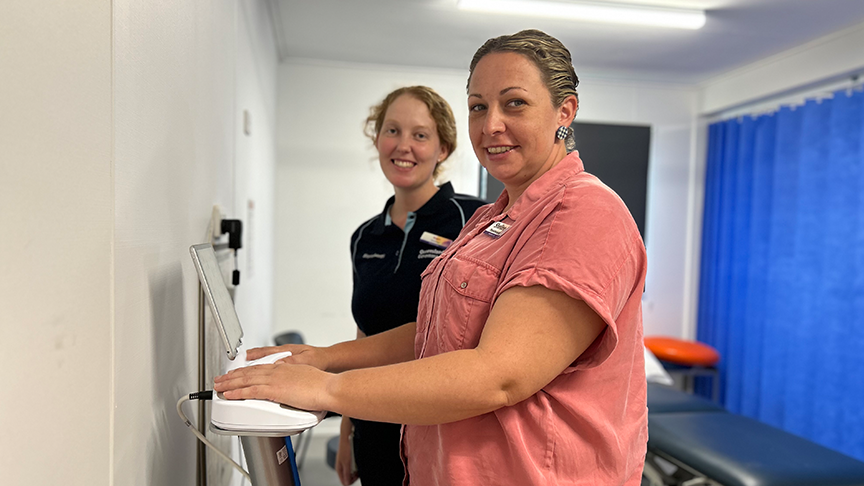
Download high resolution image [JPG 1630.77 KB]
A new L-Dex machine at Kingaroy Hospital is detecting lymphoedema earlier than traditional methods leading to better health outcomes for South Burnett residents. Lymphoedema is a condition usually caused by cancer or cancer treatments, it’s diagnosed by changes in the circumference of swollen limbs, a new machine at Kingaroy Hospital is helping detect the onset of lymphoedema earlier in patients.
Kingaroy Hospital Senior Physiotherapist, Megan Skerman said lymphoedema is swelling due to build-up of lymph fluid in the body.
“Lymphoedema is caused by problems with the lymphatic system, which results in the accumulation of excess fluid.
“Usually, if we suspect lymphoedema, we’ll assess for changes to the skin and check the circumference of the limb with a tape measure. This machine can pick up changes before the tape measure can.
“The earlier we can detect lymphoedema, the greater chance we have of reversing the process and preventing it from becoming a lifelong issue.
“The introduction of this technology is really exciting for patients, we can detect the condition earlier, treat the condition more effectively and reduce their care needs,”
Kingaroy Hospital Senior Physiotherapist, Megan Skerman
Kingaroy Hospital Senior Physiotherapist, Shellee Latimore said lymphoedema is traditionally a chronic condition that must be managed life-long, this can be quite a distressing for the patient.
“If we can catch lymphoedema early, we can help reduce the potentially life-long impact of this chronic condition on the patient. Having this technology at Kingaroy Hospital allows us to provide care closer to home for residents, where previously they’ve had to travel to Toowoomba to confirm diagnosis.
“The machine gives us a better chance of catching lymphoedema while it’s still in stage zero, rather than stage one or two.
“A common treatment method for lymphoedema is wearing a compression garment daily. If detected early, compression garments may only be required during high risk activities such as driving long distances, rather than having to wear a compression garment daily as the traditional management of chronic lymphoedema,” Ms Latimore said.
Toowoomba Hospital Foundation CEO Alison Kennedy said through everyone who attended and supported the 2022 Talwood Pink Ladies Day, the Foundation was able to fund a new L-Dex Body and Composition Analyser for Kingaroy Hospital.
“We know how important it is to our rural communities and our hospitals to have the resources they need to provide care closer to home, and we love being able to support facilities like Kingaroy and bring funding into our rural health services so they can continue to do the fantastic work they do.
“The Foundation hosts a number of events throughout the year that are 100 per cent committed to raising funds for Darling Downs Health rural health services, the results and outcomes from these funds are truly helping to make a significant difference in the lives of patients accessing these services which is just fantastic,” Ms Kennedy said.